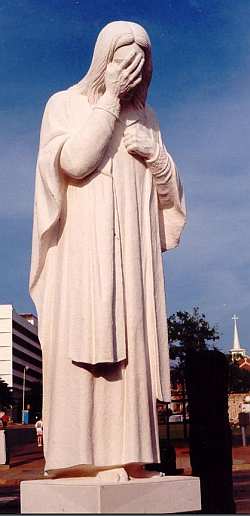I am saddened by the amount of troubling news lately. I don’t understand what is going on out there, but I am receiving more and more news of the following:
Men over 35 losing their jobs suddenly
Formerly healthy people now struggling with chronic health issues
Suicides
Maybe those are connected. I don’t know. All I know is there’s a lot of hurt happening.
George Matheson was a brilliant theology student and a man engaged to be married. When it became clear he was going blind, his fiancée abandoned him. If blindness were not enough, Matheson’s first book of theology elicited so much harsh criticism for what were deemed small deviations that he was forced to change his career direction. Matheson’s sister took care of him afterward. On the evening before his sister’s wedding, knowing that he was losing his only caretaker, Matheson, at one of the lowest points in his life, wrote these words:
O Love that wilt not let me go,
I rest my weary soul in thee;
I give thee back the life I owe,
that in thine ocean depths
its flow may richer, fuller be.O Light that followest all my way,
I yield my flickering torch to thee;
my heart restores its borrowed ray,
that in thy sunshine’s blaze
its day may brighter, fairer be.O Joy that seekest me through pain,
I cannot close my heart to thee;
I trace the rainbow through the rain,
and feel the promise is not vain,
that morn shall tearless be.O Cross that liftest up my head,
I dare not ask to fly from thee;
I lay in dust life’s glory dead,
and from the ground there blossoms red
life that shall endless be.
I don’t know what you may be facing, or how much pain you may be in, but there is a Love that will not let you go, Jesus.
I will be 51 soon, and if I have learned one thing in that time, it’s that answers are not always easy to come by. George Matheson went on to do pastoral care ministry in a small church, and I’m sure that was not as he had planned, but it seems he had a knack for it. Because he was bruised himself by the vicissitudes of life, he could help those who suffered their own bruising.
It may be that you are being broken to help those who are broken. Your pain is never wasted. And never forget that Love Himself loves you enough to have taken all your brokenness and failure upon Himself. He was broken to identify with your pain, and He does this more completely than anyone.
The Westminster Chorus singing the David Phelps arrangement of O Love That Will Not Let Me Go in the Petrikirche cathedral in Dortmund, Germany:


 The foamboard in my front yard spoke to me. The yellow fiberglass insulation told a story.
The foamboard in my front yard spoke to me. The yellow fiberglass insulation told a story.